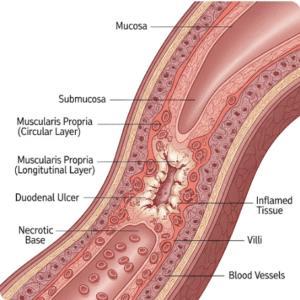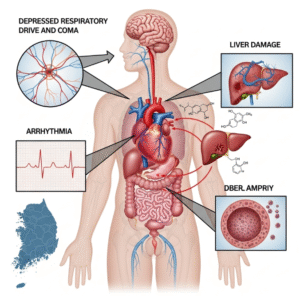Overview
Vomiting, also called emesis, is the forceful expulsion of stomach contents through the mouth. It is a common symptom that can result from multiple underlying conditions, ranging from mild viral infections to serious gastrointestinal disorders.
➤ Vomiting is often accompanied by diarrhea, nausea, abdominal cramps, or fever, which can indicate gastroenteritis or food poisoning.
➤ It can be acute or chronic, mild or severe, and may lead to dehydration, electrolyte imbalance, or nutritional deficiencies.
➤ In Korea, hospitals and clinics provide diagnostic testing, supportive care, and advanced treatments for persistent or severe vomiting.
Key Facts
► Definition: The involuntary expulsion of stomach contents through the mouth.
► Prevalence: Vomiting occurs frequently worldwide due to infections, medications, or gastrointestinal disturbances.
► Associated symptoms: Nausea, abdominal pain, diarrhea, dehydration, fever, headache, or lethargy.
► Risk factors: Viral or bacterial infections, food poisoning, motion sickness, medications, pregnancy (hyperemesis gravidarum), and gastrointestinal disorders.
► Treatment in Korea: Depends on underlying cause and may include hydration, antiemetics, hospitalization, or surgical interventions.
What Is Vomiting?
Vomiting is a protective reflex that removes harmful substances from the stomach.
➔ Acute vomiting is often caused by gastrointestinal irritation, infections, or toxins.
➔ Chronic or recurrent vomiting may indicate systemic diseases, gastrointestinal obstruction, or metabolic disorders.
➔ Vomiting can result in electrolyte imbalance, dehydration, and malnutrition if persistent.
What Symptoms Are Related to Vomiting?
Symptoms depend on cause and severity:
→ Nausea often precedes vomiting.
→ Abdominal cramps or pain may accompany gastrointestinal causes.
→ Diarrhea is common in viral or bacterial gastroenteritis.
→ Fever, chills, or malaise indicate infectious causes.
→ Dehydration symptoms: dry mouth, dizziness, reduced urination, rapid heartbeat.
→ Weight loss or fatigue in chronic or recurrent vomiting.
→ Blood in vomit (hematemesis) or stool (melena) may indicate severe GI pathology.
Causes / Possible Causes of Vomiting
Gastrointestinal Causes
➤ Viral gastroenteritis (stomach flu) – Most common cause, often with diarrhea.
➤ Food poisoning – Caused by bacteria (Salmonella, E. coli) or toxins.
➤ Peptic ulcers and gastritis – Can irritate stomach lining, causing vomiting.
➤ Obstruction or ileus – Blockage in the intestines may lead to repeated vomiting.
Systemic Causes
➔ Pregnancy (hyperemesis gravidarum) – Severe vomiting in early pregnancy.
➔ Metabolic disorders – Diabetes (diabetic ketoacidosis), kidney or liver failure.
➔ Neurological causes – Increased intracranial pressure, migraines, or vestibular disorders.
➔ Medications and toxins – Chemotherapy, antibiotics, or alcohol.
Other Causes
→ Motion sickness or vertigo
→ Psychogenic vomiting – Stress or eating disorders.
→ Severe infections such as meningitis or sepsis.
When Should I See My Doctor?
Seek medical attention if vomiting:
➤ Persists more than 24–48 hours or occurs frequently.
➤ Is accompanied by high fever, severe abdominal pain, or blood in vomit or stool.
➤ Causes significant dehydration (low urine output, dizziness, dry mouth).
➤ Occurs in infants, young children, elderly patients, or pregnant women.
➤ Is associated with weight loss, chronic illness, or neurological symptoms.
Care and Treatment
Immediate Care and Home Management
► Hydration with oral rehydration solutions or clear fluids.
► Small, frequent meals once vomiting subsides.
► Avoiding irritants such as alcohol, caffeine, spicy or fatty foods.
► Rest and avoiding physical exertion.
Medical Treatments
➔ Antiemetics such as ondansetron, metoclopramide, or dimenhydrinate.
➔ IV fluids for severe dehydration.
➔ Electrolyte replacement in case of significant fluid loss.
➔ Treating underlying cause, e.g., antibiotics for bacterial infection.
Procedural and Advanced Interventions
→ Hospitalization if dehydration, severe electrolyte imbalance, or persistent vomiting occurs.
→ Endoscopy if vomiting is due to gastric obstruction, ulcers, or bleeding.
→ Surgery in cases of intestinal obstruction, tumors, or structural abnormalities.
Treatment Options in Korea
Diagnosis in Korea
➤ Physical examination and history to identify possible causes.
➤ Laboratory tests: blood count, electrolytes, kidney/liver function, infection markers.
➤ Stool tests to detect bacterial, viral, or parasitic infections.
➤ Imaging (ultrasound, CT scan) or endoscopy if structural GI issues are suspected.
Non-Surgical Care
► Oral or IV hydration therapy.
► Antiemetic and symptomatic treatment.
► Nutritional guidance to prevent malnutrition and electrolyte imbalance.
Advanced and Surgical Care
➔ Endoscopic treatment for obstruction or GI bleeding.
➔ Surgery for bowel obstruction, tumors, or severe complications.
➔ Multidisciplinary management for chronic or complex cases.
Rehabilitation and Lifestyle Support
→ Education on food safety, hydration, and recognizing warning signs.
→ Ongoing monitoring for chronic gastrointestinal or metabolic disorders.
→ Support for patients with recurrent vomiting due to pregnancy, medications, or chronic illnesses.
Korean hospitals combine expert gastroenterologists, advanced diagnostics, and patient-centered care, ensuring effective management of vomiting and related conditions like diarrhea.













